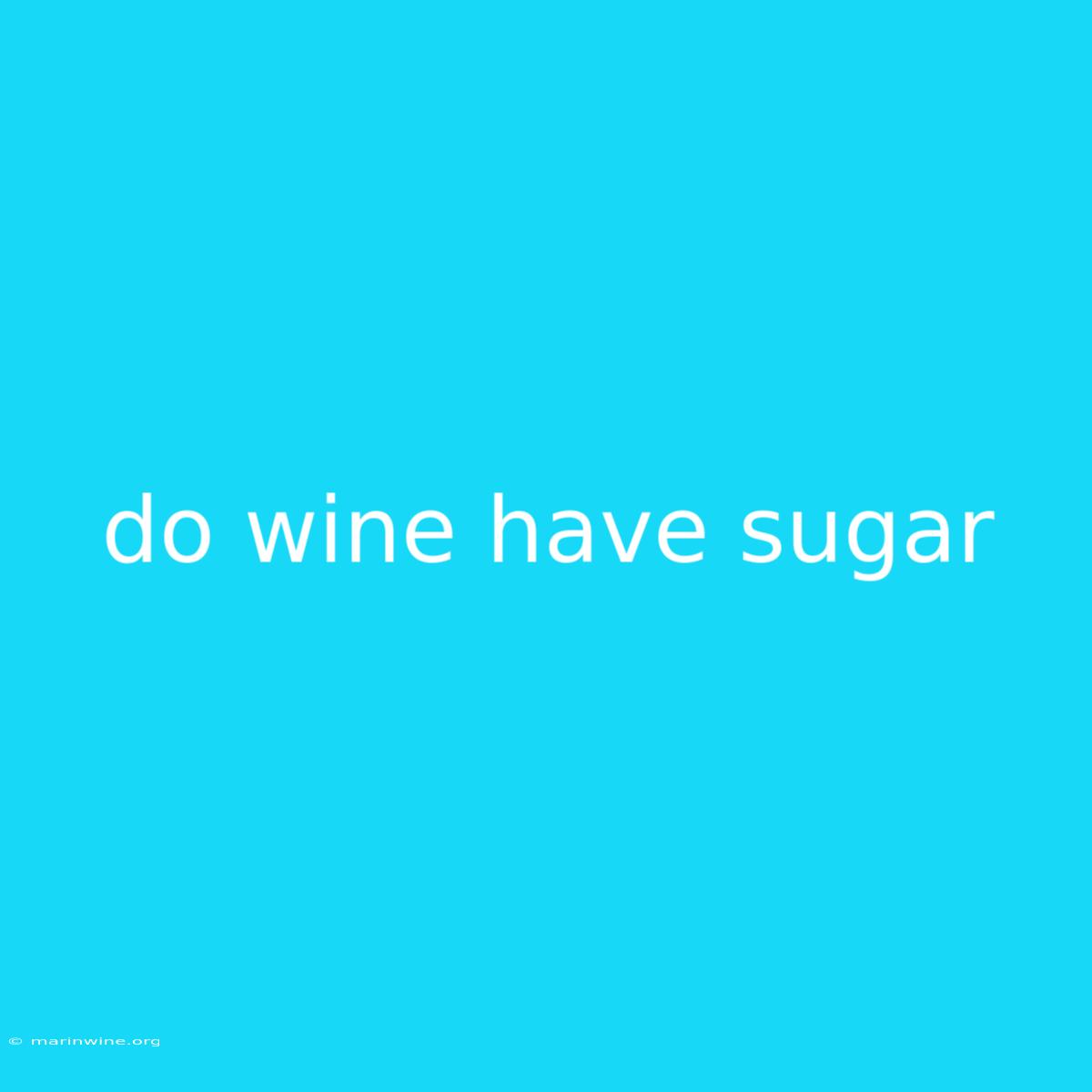Does Wine Have Sugar? Unveiling the Sweet Truth About Your Favorite Beverage
Editor's Note: You love a good glass of wine, but have you ever wondered about its sugar content? It's a common question, and we're here to clear the air!
Why It Matters: Understanding the sugar content in wine is crucial for those watching their sugar intake, following a specific diet, or simply curious about the composition of their favorite beverage. This article explores the complexities of sugar in wine, debunking common myths and shedding light on its impact.
Key Takeaways of Wine and Sugar:
| Key Takeaway | Explanation |
|---|---|
| Wine does contain sugar, but in varying amounts. | The amount of sugar depends on the grape variety, winemaking techniques, and style. |
| Residual sugar is the key to wine's sweetness. | It's the sugar left after fermentation, creating sweetness in the final product. |
| Dry wines have minimal residual sugar. | They are considered "dry" because the yeast consumes almost all the sugar during fermentation. |
| Sweet wines have higher residual sugar. | They retain more sugar, resulting in a noticeable sweetness. |
Let's delve deeper into the world of sugar in wine:
Wine and Sugar
Wine's sweetness depends on the residual sugar left after fermentation. During this process, yeast consumes the grape's natural sugars, transforming them into alcohol and carbon dioxide. The amount of sugar remaining after fermentation determines the wine's sweetness:
- Dry Wines: These have minimal residual sugar, often less than 1 gram per liter. Think Cabernet Sauvignon, Pinot Noir, and Sauvignon Blanc.
- Sweet Wines: These retain more sugar, usually between 10-200 grams per liter. Examples include Riesling, Moscato, and dessert wines.
Factors Influencing Sugar Content:
Several factors influence the sugar content in wine:
- Grape Variety: Some grapes naturally have more sugar than others, impacting the final wine's sweetness.
- Winemaking Techniques: Winemakers can manipulate sugar levels through techniques like chaptalization (adding sugar to the grape must) or stopping fermentation early to retain more sugar.
- Wine Style: Specific wine styles, like dessert wines or fortified wines, are designed to be sweet.
Beyond the Sugar: The Influence of Acidity
Wine's acidity plays a vital role in balancing sweetness. High acidity can counteract perceived sweetness, making a wine appear less sweet than it actually is. Conversely, wines with low acidity might taste sweeter due to the lack of balancing sourness.
Sugar Content in Wine: A Broader Perspective
It's important to remember that the sugar content in wine is a small part of the overall picture. Other factors, like alcohol content, tannins, and acidity, contribute to the overall flavor profile.
FAQ about Wine and Sugar
Q: Is wine bad for my blood sugar?
A: While wine does contain sugar, it's generally not a significant concern for most individuals. However, if you have diabetes or are monitoring your sugar intake, it's crucial to be mindful of your consumption and consider low-sugar or dry wine options.
Q: Can I drink wine if I'm on a low-sugar diet?
A: Yes, but choose dry wines with minimal residual sugar. Consult a healthcare professional or a registered dietitian for personalized advice.
Q: How much sugar is in a typical glass of wine?
A: It varies depending on the wine's style. Dry wines typically contain less than 1 gram of sugar per 5-ounce serving, while sweet wines can contain 10-20 grams or more.
Q: Does wine make me gain weight?
A: Wine contains calories, like any alcoholic beverage. Moderation is key, and it's essential to consider the total caloric intake when enjoying wine.
Q: Is there a way to tell how sweet a wine is without tasting it?
A: You can usually check the wine label for information on sugar content or sweetness levels (e.g., "dry," "semi-dry," or "sweet").
Tips for Choosing Wines with Less Sugar
- Opt for Dry Wines: Dry wines have the lowest sugar content. Look for labels indicating "dry" or "brut."
- Read the Label: Check for information about sugar content or sweetness levels.
- Consult a Wine Expert: Ask your local wine shop or a sommelier for recommendations on low-sugar wines.
- Experiment: Try different dry wines to discover your favorites.
Summary of Wine and Sugar
Understanding the sugar content in wine can empower you to make informed choices. From understanding how sugar influences taste to choosing wines that align with your preferences and dietary needs, the knowledge gained here can enhance your enjoyment of this beloved beverage.
Closing Message: Wine, in moderation, can be a delightful part of a balanced lifestyle. By understanding the factors influencing sugar content, you can savor its complexity and enjoy its diverse range of flavors responsibly.

